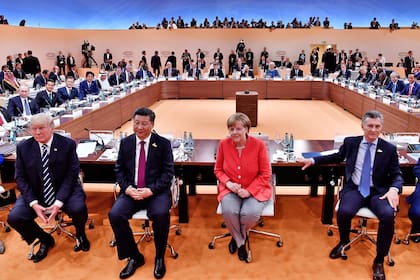
The G-20 faces its most transcendent and risky summit since 2008


PARIS.- This week, Argentina will be lucky to host the the most important G-20 summit since the 2008 financial crisis. But, hostage of populists and autocrats, it may also be the most dangerous and the one that gets the least consensus. It could even be forced to end this historic conclave without a final statement. But would that be too bad?
The countries of the G-20 represent a dominant economic weight in the world: as a whole they total 85% of global GDP, two thirds of the planet's population, 75% of trade and 80% of investment. But that informal group, although institutionalized, is not a planetary government.
Created in 1999, the G-20 left its mark especially in November 2008, when it proposed an answer to the most serious financial crisis that the world had known since 1930. That response was undoubtedly insufficient, but it had at least the virtue of creating a Financial Stability Board in charge of coordinating the work of financial regulators at an international level. The G-20 then functioned as a forum for economic cooperation. But it could have been because the panic was violent and the world was willing to make a common front. Today nothing is the same.
It is difficult to remember another time when the G-20 has met in a more divided international framework, confronted and threatened by fractures of all kinds. And especially economic
It is difficult to remember another time when the G-20 has met in a more divided international framework, confronted and threatened by fractures of all kinds. And especially economic. In 2008, China and the United States solemnly pledged to "renounce any commercial protection measure". Now, a year and a half after the arrival of Donald Trump to the White House, that spirit of cooperation that seemed to animate them evaporated as if by magic.
The same happens with the world situation. The trade war unleashed by Trump obscures growth prospects, causes tensions between the United States and China, and also between Americans and their main Western allies, especially Europe and Canada.
In the political arena, the advance of populisms in the heart of Europe, the United States and Latin America, as well as the strengthening of autocracies in Russia, China, Turkey or Saudi Arabia, all with their eternal isolationist temptations, do not allow us to foreshadow any glimpse of cooperation.
It is in this context of distrust and confrontation that the G-20 will be held in Buenos Aires. Top of irony, Argentina's president Mauricio Macri , a fervent supporter of a liberal economy, is currently experiencing a new crisis. From the economic and political point of view, it is the most vulnerable country in the group.
Fortunately, as an organizing country, Argentina was able to choose the topics that it considered to be priorities. And -in the context of a global division- it also had the intelligence to give priority to the most consensual ones.
Agenda
In the official agenda: the topics linked to the future of employment and education in the digital era; the financing of infrastructure projects in favor of development, and sustainable agriculture. In other words, the government tried to avoid intransigent positions such as protectionism, the agreement on monetary policies or the fight against global warming.
Each one of those subjects has the virtue of getting Trump mad. For that reason, the most important thing in this G20 will be the meetings organized outside the official agenda. It is expected that, in this framework, the related to the paralyzed negotiations on the free trade agreement between the European Union (EU) and Mercosur will be discussed; also the trade war between the United States and China, and the reform of the World Trade Organization (WTO).
A supplementary element distinguishes this G-20 from the previous ones: the popular disregard for democratic systems in Western countries, whose leaders put their weight in the balance for 20 years to advance international cooperation. Among those leaders is the French president, Emmanuel Macron , victim of a growing popular malaise and one of the lowest levels of favorable opinion of the Fifth Republic (29%). Angela Merkel , who until recently was the most powerful woman in Europe, arrives after having announced the end of her political career. The German chancellor pays her political courage in the face of immigration faced with criticism from even parts of her party.
When he came to power, many questioned the ability of Justin Trudeau to become a true leader. Today, those same analysts consider the Canadian premier as "the last democratic hope" of the world.
Despite the turbulence caused by her recent Brexit agreement with the European Union (EU), Theresa May will arrive with a surprising increase in popularity. In just one week, the premier went from 30% to 40% favorable opinions, the result of its determination to face the worst critics of the British political arc.
Once considered an authentic tsar by the Russians, Vladimir Putin lives the moment of less popularity of his long career. According to the Levada center, it has a 56% positive image, the worst figure in five years
Although it is never easy to measure exactly the level of sympathy of autocrats, in that block popularity does not seem to be too lavish lately. The Chinese Xi Jinping , whose country begins to feel the impact of the trade war with the United States, not only faces strong internal opposition and the distrust of most of its neighbors, but also fails to establish alliances with any Western power to break its virtual isolation .
Once considered an authentic tsar by the Russians, Vladimir Putin lives the moment of less popularity of his long career. According to the Levada center, it has a 56% positive image, the worst figure in five years.
Six months ago, Recep Tayyip Erdogan was almost a Sultan; today, the sympathy of its managers collapsed along with the collapse of the Turkish pound. His public attitude towards the recent murder of the Saudi journalist Jamal Khashoggi in the consulate of his country in Istanbul returned, however, a role that the Turkish leader intends to take advantage of in Buenos Aires. It is possible, precisely, that Erdogan meets in Argentina with Mohammed ben Salman , the Saudi crown prince who is considered by all the intelligence services of the world to be a commissioner of the murder, and who Trump defends with tooth and nail.
In this context of tensions, bilateral meetings will be more important than ever. Putin must meet with Trump to analyze Washington's intention to abandon the short and medium-range nuclear missile (INF) missile treaty, which the Republican considers "obsolete." But the most tense meeting of all would be Trump's with Xi. The Chinese asks that the final statement of the G-20 emphasize the defense of multilateralism, an inadmissible allusion to the North American who, only interested in his internal front, refuses to sign such proclamations in an international document.
The most anticipated face-to-face
- Trump-Xi: Given the escalation of the US trade war and China, of global impact, the meeting between both is the one that generates more expectation. After months of friction, a possible resolution to the conflict in Buenos Aires is envisioned.
- Macri-May: They will meet at a delicate moment for the premier, which negotiates with difficulty the agreement with the EU for the Brexit; the President wants to specify a new commercial flight between Argentina and the Malvinas Islands, a step to relax the bilateral link.
- Trump-Putin: Heavyweights of global power, will meet again in a bilateral meeting after the first meeting with good tuning in Helsinki, which led Trump's critics to accuse him of flirting with the Kremlin.
- Erdogan-Mohammed: The murder of journalist Jamal Khashoggi at the Saudi consulate in Istanbul shook the Middle East board, a flammable region. In this context of high tension between Riyadh and Ankara, the Saudi Crown Prince, suspected of having instigated the crime, asked to meet with Erdogan.
- Trump-Xi: In the face of the escalation of the US-US trade war. and China, of global impact, the meeting between both is the one that generates more expectation. After months of friction, a possible resolution to the conflict in Buenos Aires is envisioned.




